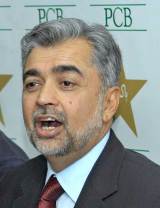
|

Nasim Ashraf: 'There are lessons from this to be learnt for everyone'
© Getty Images
|
|
Nasim Ashraf, chairman of the Pakistan Cricket Board, has said that the decision of the appeals committee to overturn the drugs ban on Shoaib Akhtar and Mohammad Asif is an honest and open one and should be respected.
Ashraf told Cricinfo, "We respect the decision because the committee was set up and acted in an open, transparent matter. It has considered evidence from all parties, it has given players ample opportunity to present their case and come to a decision based on that."
The judgment has questioned the workings of the previous committee, finding flaws in the manner in which it operated. In particular, concern was raised over the fact that while it was constituted to work within the guidelines of the PCB's anti-doping policy, the punishment it decreed - and the benchmarks it derived them from - were based on the ICC's anti-doping regulations.
"It is worthwhile to note that the ADC (Anti-doping commission) which was a creature of the PCB Anti-Doping regulations, while repeatedly referring to the various PCB regulations under which the players were charged, proceeded against and even punished, without any ostensible rationale sought to rely on distinct benchmarks of 'No fault or negiligence' and 'no significant fault or negligence' from the ICC' anti-doping code in its decision," the report states.
It states later that 'exceptional circumstances', on which the players defended themselves, were defined by the PCB 'on a significantly different plane' than the ICC. "The standard of 'exceptional circumstances' under the ICC code and the PCB regulations is entirely different in terms of language, scope and meaning...The confusion between the applicability of standards of 'exceptional circumstances' fatally plagued the final decision of the ADC."
Ashraf said the crux of the decision to overturn the ban was based on this technicality. "Shahid Hamid (chairman of the original committee) accepted the fact the PCB rules should have applied to the matter and that it was an internal matter. But the judgments his tribunal gave were according to WADA and ICC rules. It was this technicality that formed the crux of the new decision."
But the report also points out that while under ICC regulations it is the players' responsibility for what substances are taken, irrespective of intent, fault or negligence, the PCB's anti-doping regulations impose no such "onerous burdens on the players," instead placing responsibility on the PCB to ensure its players are educated. This responsibility, says the report, has not been fulfilled comprehensively.
Also, in light of the lawyers for Shoaib Akhtar arguing that providing players booklets and lists were not enough, Ashraf acknowledged that the PCB would have to become more strenuous in the future.
"I think there are lessons from this to be learnt for everyone. For all players this is a very good lesson because the responsibility ultimately lies with them for what goes into their body. But the PCB will have to be much more stringent and strenuous in educating players of the dangers of such issues. Under our own policy appeals are allowed for players and they have used that to establish that exceptional circumstances did exist."
Ashraf added that there were lessons from this case for the international cricket community and not just Pakistan. "Cricket has only had Shane Warne as a case example before this. Nobody really had any experience in this matter and there are lessons to be learnt from this.
"That is why we called in Mark Gay, who is a world renowned lawyer especially in sports doping matters, to offer advice on the matter. Some of his observations were quite important as the report reveals."
Osman Samiuddin is Pakistan editor of Cricinfo
